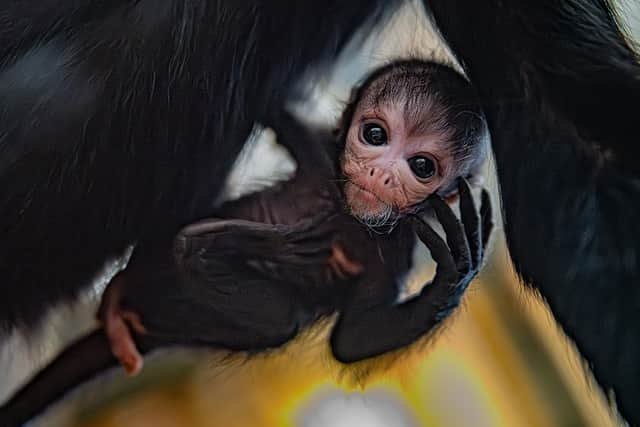Chester Zoo: Visitors get first glimpse of tiny newborn spider monkey 'Olive'
and live on Freeview channel 276
Visitors have caught their first glimpse of one of Chester Zoo's newest arrivals, a tiny, unusual, and very rare baby monkey.
The infant, a Colombian black-headed spider monkey, was born back in December at the British conservation zoo, but has now been spotted for the first time by zoo guests, cradled in the arms of mum Kiara. Zookeepers have revealed the young primate is a female, and have named her Olive.
Advertisement
Hide AdAdvertisement
Hide AdOlive's arrival is cause for celebration. South America's wider black-headed spider monkey population is classified as 'endangered' by the International Union for Conservation of Nature (IUCN), while the Colombian subspecies is considered 'vulnerable' - with more than 80% of its population lost in the last 50 years.


This species, which eats mostly fruit, faces threats from hunting and the illegal wildlife trade. The ongoing destruction of their rainforest home, driven mainly by agriculture, has also caused severe habitat fragmentation - and the species now requires urgent attention to help safeguard their future, the zoo says. Primatologists at Chester Zoo manger a co-ordinated effort between European zoos working to boost numbers, and prevent the charismatic monkeys from disappearing altogether.
Head of mammals Mark Brayshaw said life as a baby spider monkey was "very bumpy", as the fascinating primates are incredibly agile - spending the majority of their time leaping between the treetops and using their tails to hang upside down while foraging for food. "It’s fantastic to see Kiara cradling baby Olive closely and being so attentive. Olive will cling to mum’s belly for a few months, before gaining enough confidence to start branching off on her own and start exploring independently – which will be great to see," he continued.
“Spider monkeys face huge survival challenges in the wild. In welcoming new life into the conservation breeding programme, we’re contributing to global efforts to secure a future for these highly endangered primates," he said. "In tandem with offering education, carrying out scientific research and improving public awareness, we hope to play our part in reversing their decline and ensuring the species thrives long into the future."
Advertisement
Hide AdAdvertisement
Hide AdTo better understand the rare primates, conservationists and researchers have studied the spider monkey group at Chester Zoo and its social structure. These studies have developed methods for recording behavioural data, which have then been transferred and applied to vital conservation action in the wild. The species gets its name from its spider-like appearance thanks to their long, narrow limbs, long tails and black fur. Their prehensile tails are often longer than their bodies, acting as an extra limb that wraps around branches and allows them to move freely while collecting food with their hands.
Comment Guidelines
National World encourages reader discussion on our stories. User feedback, insights and back-and-forth exchanges add a rich layer of context to reporting. Please review our Community Guidelines before commenting.
